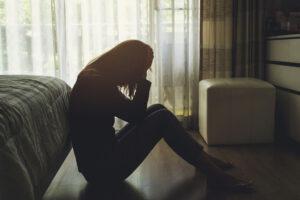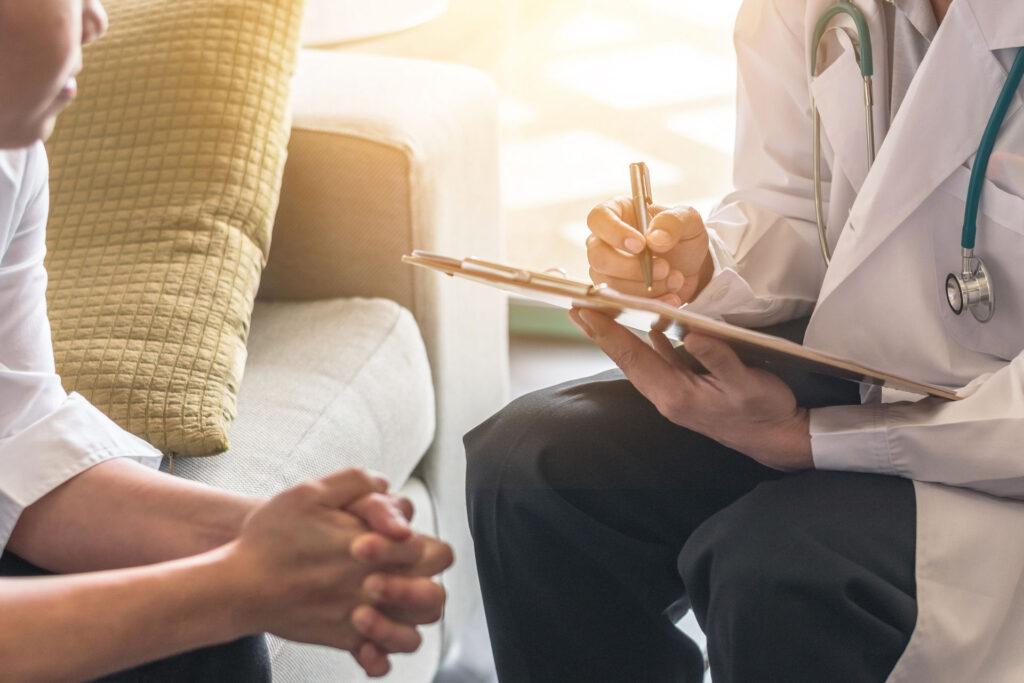Physical and mental health are interconnected. The adverse health consequences of social isolation range vary from sleeplessness to lowered immune function. Loneliness is associated with higher anxiety, depression, and suicide rates. There’s a connection between mental illness and isolation, and the effect it has on people’s behaviors.
At 449 Recovery Center in Mission Viejo, California, our mental health treatment center offers high-quality care to help people suffering manage their conditions more efficiently.
What are Social Isolation and Loneliness?
Social isolation is the absence of social contact and may lead to loneliness. In this way, they are related, but different. Loneliness is the depressing feeling of being alone or separated from others. Social isolation is the lack of social contacts and having few people to regularly interact with. While you may live alone and not feel lonely or socially isolated, you may feel lonely while being with other people. Isolation can involve:
- staying at home for long periods of time
- not having access to services or community involvement
- little or no contact with family, friends, and acquaintances
The term, “loneliness,” is often used interchangeably with isolation. You may feel lonely in a crowd, but you’re not socially isolated. Isolation is an objective state–the number of contacts you have can be counted. On the other hand, loneliness is a subjective experience–it depends on your viewpoint.
What Causes Social Isolation?
 Several factors contribute to social isolation. A lot of things can prevent a person from leaving their home and having contact with other people. They include:
Several factors contribute to social isolation. A lot of things can prevent a person from leaving their home and having contact with other people. They include:
- Long-term illness
- Mental health problems
- Loss of loved ones
- Disabilities
- Remote location and transportation issues
- Unemployment or other economic problems
- Substituting social media for in-person socialization
- Domestic violence
Some individuals are physically able to go out and see people but are held back by factors such as:
- Depression
- Social adversity
- Being a caregiver for a loved one
- Bereavement
Any of these factors can be impediments to forming and maintaining social networks and may lead to loneliness and isolation.
What are the Effects of Social Isolation and Loneliness?
Although the terms have slightly different meanings, both can be distressing experiences and have harmful effects on you, physically, mentally, and emotionally.
Social isolation and loneliness are linked to higher risks for:
- Elevated blood pressure
- Heart disease
- Weak immune functions
- Obesity
- Death
People who are socially isolated or lonely may not get enough exercise, drink too much alcohol, smoke, and frequently have problems sleeping. These can increase the risk of serious health conditions further.
Loneliness and social isolation might also be bad for the health of your brain. Social isolation and loneliness have been associated with:
- Depression
- Anxiety
- Poor cognitive function
- Increases suicidal thoughts
- Higher risk for dementia (particularly for Alzheimer’s disease)
- Loss of ability to perform everyday tasks like driving, paying bills, taking medication, and cooking
Lonely people may experience emotional pain. Losing a feeling of connection and community can change the way you view the world. A person experiencing chronic loneliness may feel threatened and not be able to trust other people.
This emotional pain can activate the same stress reactions in the body as physical pain. When this continues for a long time, it can lead to:
- Chronic inflammation (can damage tissues)
- Reduced immunity (less ability to fight off disease)
This emotional pain can raise your risk of chronic diseases and make you more susceptible to infectious diseases.
What’s the Link Between Isolation and Addiction?
Loneliness, addiction, social isolation, and mental illness often go hand-in-hand. Alcoholism is a known risk factor of loneliness and social isolation is as unhealthy as smoking 15 cigarettes a day. The association between social isolation and addiction comes when a person substitutes chemicals for healthy relationships. This is one of the reasons that people with a substance use disorder (SUD) need a healthy support system to recover from active addiction.
The Dopamine Factor
Because humans are social creatures by nature, even introverts need interpersonal communication and relationships. Healthy social relationships trigger dopamine in the brain. Dopamine is a chemical in the brain that is linked to feelings of well-being or pleasure, but when social interactions are missing, loneliness and depression can result because of the lack of dopamine.
Consuming alcohol or drugs typically will also trigger the release of dopamine. Research has shown that dopamine is a key factor in the development of addiction. As the brain becomes used to experiencing the flood of dopamine when the person uses the substance, it gradually adjusts to the extremes and becomes dependent on the drug just to function normally, not just to get high.
A study of rats at the College of Natural Sciences in Austin, TX showed that those who were cut off from their community became more sensitive to the rewards of taking alcohol or drugs because their brains were more vulnerable to experiencing sudden floods of dopamine. The conclusion was that those who were living in a group situation were less sensitive to the drugs because of the pleasure and stimulation provided by social interaction.
The Vicious Cycle: Mental Illness and Isolation
By now, it should be no surprise that loneliness has harmful effects on your mental and physical well-being and the feelings can come from many reasons. Loneliness not only increases the risk of depression and suicidal thoughts, but it can also trigger or make substance abuse worse.
Depression or loneliness can result in the use of drugs or alcohol to cope with those feelings. Finding “comfort” in substances becomes a way to numb the pain of feeling alone, unloved, rejected, and confused.
Abusing substances can allow a person to avoid confronting their mental illness and isolation, giving a false sense of security. It’s a vicious cycle because when the substance isn’t present, all the emotions they are meant to mask come flooding back. When a person doesn’t find ways to cope with the original emotion, it just builds even more.
People who use substances to deal with loneliness avoid dealing with the reality of their situation and their feelings. Often, they live in denial, guilt, and fear. They may feel trapped in the situation and frequently hurt those around them because they are hurting and angry. And addiction and loneliness also increase co-occurring disorders of depression and anxiety, increasing suicidal thoughts, and risk of self-harm.
The Cycle
As loneliness fuels addiction, addiction causes loneliness. As the addiction gets worse, many people damage personal relationships and lose friends. This creates an even stronger feeling of loneliness and isolation. It is incredibly difficult to cope with these feelings without using drugs or alcohol and so, the cycle continues. Thus, loneliness can be both a consequence and a cause of addiction.
Treatment
People struggling with the effects of social isolation should be aware of their symptoms and get help from experts if they continue or become severe. Therapists can help by examining underlying issues related to isolation or self-isolation. For example, your isolation may be an indication of depression or an anxiety disorder.
Along with identifying underlying issues, a therapist can create a treatment plan that can help you regain a feeling of control over your social life. Therapy services can help address the psychological and emotional issues that lead to mental illness and isolation. The types of therapies we utilize include:
Cognitive-behavioral therapy (CBT)
CBT is a method of talk therapy that helps people recognize their negative or inaccurate thoughts and how they affect their behavior. Sessions can help people see their misperceptions and reshape their negative thinking patterns.
Exposure therapy
Exposure therapy programs help individuals break their avoidance and fear patterns. During sessions, people are exposed (either through their imagination or in person) to situations they typically avoid. They learn to confront fears, process their emotions, and manage anxiety.
When Should You Seek Professional Help?
If you experience any of the following, you should consider consulting a mental health or medical professional:
- Delusions or hallucinations
- Confused thinking
- Excessive feelings of fear and anger
- Extreme emotional swings
- Inability to cope with day-to-day problems
- Considerable changes in sleeping or eating patterns
- Persistent depression
- Social withdrawal
- Substance abuse
If your situation limits in-person contact, you can connect with a mental health professional by phone or videoconferencing. (TeleHealth)
Sometimes, isolated people find it hard to ask for help. When others keep a watch for those who might need assistance but are hesitant to ask, they can play a part in decreasing the negative effects of isolation on the community.
Tips for Breaking Free from Mental Illness and Isolation
What if you have family and friends and you still feel misunderstood or alone? Some strategies that can help include:
- Spend less time on social media. Instead of that, invite social media friends to an in-person get-together.
- Commit yourself to calling or texting a loved one every day.
- If you have children at home and feel isolated. Ask a family member or friend for help with childcare. Just an hour of adult time each week can help battle loneliness.
- Let your loved ones know how you feel. You may discover that what you thought was a snub was just a lack of communication.
Help is Available at 449 Recovery
If isolation and loneliness have left you feeling hopeless and helpless, there is help available. Located in Mission Viejo, CA, 449 Recovery has mental health professionals who are specially trained in the treatment of depression, anxiety, behavioral issues, and substance abuse. You don’t have to suffer in silence. Contact us today and find out all the services we can provide to you or a loved one.

Dr. Warren Taff MD, graduated from the University of Birmingham, England School of Medicine, with a BA from Rutgers University. He then went on to UCLA School of Public Health in Los Angeles Health and Human Services and received an MPH. He also attended an internship in internal medicine, with the Veterans Administration. Dr. Taff’s residency includes General Psychiatry at USC, with elective residencies at the Royal Prince Alfred Hospital in Sydney, Australia, and Royal College of Psychiatry. Board certifications include American Board of Psychiatry and Neurology. Dr. Taff has extensive experience in both psychiatry and addiction medicine, extending from 1979 to present. He has held professional titles that include Chief of Staff and Medical Directorship in both hospitals and private sectors.







